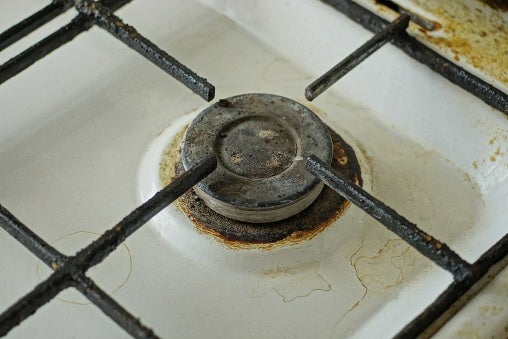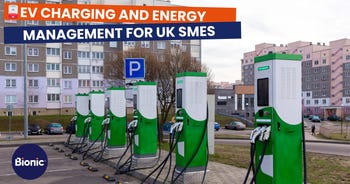What to do if your energy supplier goes bust or ceases trading
Tomato Energy is the latest supplier to have gone bust. Ofgem has appointed British Gas to be Supplier of Last Resort. If your business has been affected, give Bionic a call to discuss your options.
When an energy supplier goes bust, it’s usually because they weren’t financially strong enough to handle rising costs (more on that later). That’s why energy regulator Ofgem introduced financial rules to make sure all suppliers have enough money to stay afloat.
But some in the industry think those rules aren't strict enough, which could lead to further supplier closures.
Chris O’Shea, the Chief Executive of Centrica (parent company British Gas), has claimed that some energy suppliers – including the UK's largest, Octopus Energy – aren’t meeting those financial targets. He’s worried that if these firms keep taking on new customers without enough money in reserve, the UK could face another wave of supplier failures.
More than 70 energy suppliers have gone bust or ceased trading since 2016, and Octopus Energy has taken on millions of extra customers as the Ofgem-appointed Supplier of Last Resort (SoLR) following some supplier closures.
Octopus admitted it missed the target but said it has agreed a plan with Ofgem and is not breaking any rules. Ofgem confirmed that as long as suppliers have a solid plan to improve their finances, they’re allowed to keep trading. The regulator says it's keeping a close eye on things to protect customers and avoid another energy market collapse.
But why do suppliers go to the wall? And what should you do if your business energy supplier goes bust or stops trading? Read on to find out everything you need to know.

Five-point summary
- More than 70 energy suppliers have gone bust or ceased trading since 2016. 39 of these went between 2016 and 2020. A further 34 energy suppliers have ceased trading or gone bust since January 2021
- Suppliers usually go bust as they aren't financially resilient enough to cope with rising wholesale prices and government levies. A squeeze on household budgets is also an issue
- If your supplier goes bust, your supply won't be disrupted or cut off. Ofgem, the UK energy regulator, has systems in place to make sure gas and electricity are supplied to your premises as normal
- A new supplier, known as a Supplier of Last Resort (SoLR), will be announced within 72 hours of your supplier going bust. You will be switched to this new supplier as soon as possible
- When you're switched to your SoLR, you’re free to switch again without any exit fees. It’s worth comparing deals to find a better rate, as it's unlikely you'll be on your new supplier's best rates. Bionic can help with this.
What happens if your energy supplier goes bust or stops trading?
If your energy supplier goes bust or ceases trading, the Ofgem safety net will ensure that your business is switched to a new supplier as soon as possible and that your premises won't experience any disruption to its electricity and gas supply.
Here's what the energy regulator suggests you do if your business energy provider stops trading:
- Take a meter reading - To help make sure your final bill is accurate, it's worth taking a meter reading, if possible. You can also cancel any Direct Debits, if necessary, although it might be worth waiting until you've signed up to a new deal before cancelling.
- Wait for a new supplier to be appointed - The Ofgem safety net means a new supplier will automatically be appointed and there'll be no disruption to your supply. Your new supplier should be announced within 72 hours of your supplier going bust and then appointed within 14 days.
- Arrange a new business energy contract - When your new supplier gets in touch, you'll need to negotiate a new energy contract, so don't just sign up for the first deal offered to you. This could be a good time to shop around and switch, as you won't be charged any exit fees at this point. Speak to the team at Bionic to see if they can get better rates for your business.
Although Ofgem advises business owners to do nothing until it has appointed a new supplier - known as a Supplier of Last Resort (SoLR) - if you had a switch in progress when your supplier went bust, you should still be moved to your new supplier as arranged.
If you've switched with Bionic and your old supplier has gone bust before your new contract has started, give our team a call on 0800 156 0899.
How long will it take to switch to a new business energy supplier?
When your business energy supplier goes bust, a new supplier should be appointed by Ofgem within 14 days.
To try and make sure your business is switched to as competitive a deal as possible, the regulator puts all of the old supplier's contracts into a bidding process. Once this is complete, it will choose the supplier it feels best suits the needs of these customers.
If you have a smart meter and your new supplier isn't compatible, this meter will still work but without the smart functionality. This means it will operate as a regular meter and you'll need to provide manual meter readings.
Ofgem will announce the details of your new supplier on its website and social media channels, and your new supplier will be in touch to arrange a new contract. But remember, you don't have to sign up for an energy contract with your SoLR, and so it might be worth shopping around to see if you can get a better deal elsewhere.
If you're in this position, give Bionic a call on 0800 156 0899.
What happens with your energy contract when your supplier ceases trading?
If your energy supplier goes bust or ceases trading, your contract with them will end automatically.
When Ofgem appoints your new supplier, it will usually place you on a deemed contract or one of its variable rate deals. This means you'll most likely pay higher rates than on your previous fixed deal and will be more vulnerable to future energy price rises.
The rates are higher on these deals because there is more risk to the supplier. This is because your new supplier doesn't know you as a customer, meaning it can't be certain of how you manage your monthly payments. Another reason rates could be higher is that this new supplier might also have to buy extra wholesale energy at short notice for new customers. If this is the case, it's likely these extra charges will be passed onto customers.
What if you're in debt with your old energy supplier?
If you're in debt with your old energy supplier, you'll still need to repay this debt.
If you're in debt and looking to switch away from the Ofgem-appointed SoLR, being in debt could mean your switch is blocked until the debt is repaid.
If your new supplier takes on the debt, they'll be in touch to work out a repayment plan.
If an administrator takes on the debt, they will collect payments on behalf of your old supplier. This means you may be billed by the administrator instead of your old supplier.
In either case, you should negotiate a manageable repayment plan, especially if you're struggling with the cost of your business energy bills.
What if you're in credit with your old energy supplier?
If you were in credit with your old energy supplier, Ofgem will try to find a supplier that is able to refund some or all of the money to you. But, unlike when a domestic energy supplier goes bust, this isn't guaranteed by the Ofgem safety net.
You'll need to wait for your new supplier to get in touch and let you know what the situation is. If they can't refund your credit then you'll need to get in touch with your old supplier's administrator. You should be able to find details of who the administrator is on your old supplier's website.
When you get in touch with the administrator, you'll have to register your business as a creditor (this is just the technical term for someone that is owed money) and prove that your account was in credit. You can do this using old bills and statements, which you might have as paper copies, in your emails, or you may need to log into your online account to get them.
This process can take a long time, possibly longer than a year, and the amount you get back will depend upon how much your old supplier owes to all of its creditors. This means you might not get back all the money you're owed.
What can you do while you wait for your new supplier?
There are a few proactive steps you can take while you wait for your new supplier to contact you.
If you have an online account, it’s a good idea to log in and check your balance and download any bills to review yourself. Before your new supplier contacts you, you should also:
- Take meter readings. If possible, take a photo of your meter readings as well.
- Keep any old bills you have as these can be used to prove payment history, credit balance or debt.
- Make a note of your account balance. This is easy to find - it should be on your most recent statement.
To help avoid running into payment issues, it's worth waiting until your new account is set up before cancelling your Direct Debit.
What if you have an unresolved complaint against your old supplier?
If you made a complaint to your old supplier that hasn't been dealt with, you should raise it again with your new supplier. This includes complaints about billing and your account balance.
But your new supplier isn't obliged to take any unresolved complaints further. If your complaint had been escalated to the Ombudsman, they will get in touch with you to discuss what happens next.
How many energy suppliers have ceased trading?
More than 70 energy suppliers have gone bust or ceased trading since 2016.
34 energy suppliers (listed below) have ceased trading or gone bust since January 2021:
| Supplier | When did it go bust? | What happened next? | Number of customers |
| Tomato Energy | November 2025 | British Gas | 15,000 domestic and 8,000 non-domestic customers |
| Rebel Energy | April 2025 | British Gas | 80,000 domestic and 10,000 non-domestic customers |
| Opus Energy | Septemeber 2024* | Contracts sold by Drax to EDF Enerygy | 90,000 SME customers |
| UK Energy Incubator Hub | July 2022 | Octopus Energy appointed SoLR | 3,000 domestic customers |
| Whoop Energy | February 2022 | Yü Energy | 50 domestic and 212 non-domestic customers |
| Xcel Power Ltd | February 2022 | Yü Energy | 274 non-domestic customers |
| Together Energy/Bristol Energy | January 2022 | British Gas appointed SoLR | 176,000 domestic customers |
| Zog Energy | December 2021 | EDF Energy | 11,700 |
| Zebra Power | November 2021 | British Gas appointed SoLR | 14,800 domestic customers |
| Omni Energy | November 2021 | Utilita Energy appointed SoLR | 6,000 domestic customers |
| AmpowerUK | November 2021 | Yü Group appointed SoLR | 600 domestic customers |
| Bluegreen Energy Services Limited | November 2021 | British Gas appointed SoLR | 5,900 domestic customers |
| CNG | November 2021 | Pozitive Energy appointed SoLR | 41,000 non-domestic customers |
| Neon Reef | November 2021 | British Gas appointed SoLR | 30,000 domestic customers |
| Social Energy Supply | November 2021 | British Gas appointed SoLR | 5,500 domestic customers |
| Bulb | November 2021** | Placed into special administration* | 1.5 million customers (inc. 12,000 non-domestic) |
| Entice Energy | November 2021 | ScottishPower appointed SoLR | 5,400 domestic customers |
| Orbit Energy | November 2021 | ScottishPower appointed SoLR | 65,000 domestic customers |
| MA Energy | November 2021 | Smartest Energy | 300 non-domestic customers |
| Pure Planet | October 2021 | Shell Energy appointed SoLR | 235,000 domestic customers |
| Colorado Energy | October 2021 | Shell Energy appointed SoLR | 15,000 domestic customers |
| Daligas | October 2021 | Shell Energy appointed SoLR | 9,000 domestic and non-domestic customers |
| GOTO Energy Limited | October 2021 | Shell Energy appointed SoLR | 22,000 domestic customers |
| Utility Point | September 2021 | EDF appointed SoLR | 220,000 domestic customers |
| People's Energy | September 2021 | British Gas appointed SoLR | 350,000 domestic and 1,000 non-domestic customers |
| Avro Energy | September 2021 | Octopus Energy appointed SoLR | 580,000 domestic customers |
| Green Supplier Ltd. | September 2021 | Shell Energy appointed SoLR | 255,000 domestic and an undisclosed number of non-domestic customers |
| Enstroga | September 2021 | E.ON appointed SoLR | 6,000 domestic customers |
| Igloo Energy | September 2021 | E.ON appointed SoLR | 179,000 domestic customers |
| Symbio Energy | September 2021 | E.ON appointed SoLR | 48,000 domestic and an undisclosed number of non-domestic customers |
| HUB Energy | August 2021 | E.ON appointed SoLR | 6,000 domestic and 9,000 non-domestic customers |
| PFP Energy | August 2021 | British Gas appointed SoLR | 82,000 domestic and 5,600 non-domestic customers |
| MoneyPlus Energy | August 2021 | E.ON appointed SoLR | 9,000 domestic customers |
| Green Network Energy | January 2021 | EDF appointed SoLR | 360,000 domestic and an undisclosed number of non-domestic customers |
| Simplicity Energy | January 2021 | British Gas appointed SoLR | 50,000 domestic customers |
*Opus Energy is part of the Drax Group. On June 26, 2024, Drax announced that it had agreed to sell 90,000 of Opus Energy Group's small and medium-sized enterprise (SME) customers to EDF Energy. This is scheduled to be completed in September 2024 (subject to a regulatory assessment).
**Ofgem said in a statement regarding Bulb: "We’ve decided to support Bulb being placed into special administration, which means it will continue to operate with no interruption of service or supply to members. If you’re a Bulb member, please don’t worry as your energy supply is secure and all credit balances are protected.”
The 39 suppliers below ceased trading or went bust between 2016 and 2020:
| Supplier | When did it go bust? | What happened next? |
| iSupply | Septemeber 2020 | EDF Energy appointed SoLR |
| Robin Hood Energy | Septemeber 2020 | Sold to British Gas |
| Angelic Energy | Septemeber 2020 | Sold to British Gas |
| Gnergy | Septemeber 2020 | Sold to British Gas |
| CitizEn Energy | Septemeber 2020 | Sold to British Gas |
| Ebico | Septemeber 2020 | Sold to British Gas |
| Fosse Energy | Septemeber 2020 | Sold to British Gas |
| Great North Energy | Septemeber 2020 | Sold to British Gas |
| The Leccy | Septemeber 2020 | Sold to British Gas |
| RAM Energy | Septemeber 2020 | Sold to British Gas |
| Southend Energy | Septemeber 2020 | Sold to British Gas |
| White Rose Energy | Septemeber 2020 | Sold to British Gas |
| Your Energy Sussex | Septemeber 2020 | Sold to British Gas |
| Yorkshire Energy | December 2020 | ScottishPower appointed SoLR |
| Britsol Energy | October 2020 | Acquired by Together Energy |
| Tonik | October 2020 | ScottishPower appointed SoLR |
| Gnergy | March 2020 | Bulb appointed SoLR |
| Better Energy | March 2020 | Customers switched to PFP |
| Breeze Energy | December 2019 | British Gas appointed SoLR |
| Toto | October 2019 | EDF Energy appointed SoLR |
| Eversmart | September 2019 | Utilita appointed SoLR |
| Solarplicity | August 2019 | EDF appointed SoLR |
| Brilliant Energy | March 2019 | SSE appointed SoLR |
| Cardiff Energy | March 2019 | SSE appointed SoLR |
| Economy Energy | January 2019 | Ovo Energy appointed SoLR |
| Our Power | January 2019 | Utilita appointed SoLR |
| One Select | December 2018 | Together Energy appointed SoLR |
| Extra Energy | November 2018 | Scottish Power appointed SoLR |
| Spark Energy | November 2018 | Ovo Energy appointed SoLR and acquired Spark Energy Ltd. operating group |
| Usio Energy | October 2018 | First Utility appointed SoLR |
| Snowdrop Energy | October 2018 | Transferring customers to Nabuh Energy |
| Affect Energy | August 2018 | Acquired by Octopus Energy |
| Electraphase | August 2018 | Administration. All customers switched |
| Gen 4U | July 2018 | Octopus Energy appointed SoLR |
| Iresa | July 2018 | Octopus Energy appointed SoLR |
| Flow Energy | May 2018 | Acquired by Co-Operative Energy |
| Future Energy | January 2018 | Green Star Energy appointed SoLR |
| Brighter World Energy | January 2018 | Customers moved to Robin Hood Energy |
| GB Energy | November 2016 | Co-operative Energy appointed SoLR |
Did Opus Energy go bust?
No. Opus Energy didn't go bust, but did cease trading from September 2024, when EDF Energy took over its existing non-domestic energy contracts.
What's the difference between a business going bust and ceasing to trade?
When a business goes into liquidation - or 'goes bust' - it closes down completely, is removed from the register at Companies House and has any assets sold off to repay creditors. When a company ceases trading, it can still be registered as a limited company even though its business activities have ended.
Why are energy suppliers going bust or ceasing to trade?
More than 70 energy suppliers have gone bust or ceased trading since 2016, affecting thousands of homes and businesses across the UK.
Several factors lead to suppliers no longer being able to trade, including:
- Rising wholesale costs - Wholesale energy costs are the prices suppliers pay to buy the gas and electricity they sell to you. Some suppliers set their rates low to entice new customers, but then come unstuck when wholesale prices suddenly soar and they lose money on those low-rate fixed-energy contracts.
- Government levies - The government has charges in place to support vulnerable customers and encourage the use of renewable energy sources, such as the Renewables Obligation (RO). If suppliers can't afford to pay these levies, they're fined. This can be enough to put some suppliers out of business. Spark Energy, for instance, went bust days after it missed a deadline to make a £14.4 million RO payment.
But why have wholesale costs risen to such levels that suppliers can't offer rates at previous levels and eventually go under? Again, there are several reasons, including:
- Gas shortages across Europe
- High demand for liquefied natural gas (LNG) from Asia
- Delays and complications to the Nord Stream 2 pipelines
- Low winds have meant less renewable energy generation
- A fire caused damage to an electricity interconnector between the UK and France
- The conflict in Ukraine and the closing down of the Nord Stream 1 pipeline
To find out more, check out What is going on with energy prices in the UK?
How Bionic can help if your supplier goes bust
When an energy supplier goes bust and you're appointed a Supplier of Last Resort, this switch will happen automatically. But you'll be on that supplier's standard variable or out-of-contract rate, which will be higher than many fixed rates on offer.
One call to the energy experts at Bionic is all it takes to compare rates from a panel of suppliers and switch to a better deal. Click the Start a Quote button on the right hand side of this page to see how much you could save.








